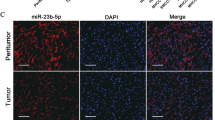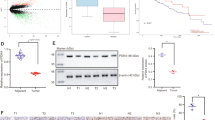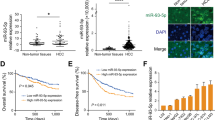Abstract
The microRNA miR-125b is multi-faceted, with the ability to function as a tumor suppressor or an oncogene, depending on the cellular context. To date, the pro-apoptotic role of miR-125b and its underlying mechanisms are unexplored. In this study, both gain- and loss-of-function experiments revealed that miR-125b expression not only induced spontaneous apoptosis in various cell lines derived from the liver, lung and colorectal cancers, but also sensitized cancer cells to diverse apoptotic stimuli, including nutrient starvation and chemotherapeutic treatment. Furthermore, downregulation of miR-125b was a frequent event in hepatocellular carcinoma (HCC) tissues, and the miR-125b level was positively associated with the rate of apoptosis in HCC tissues. Subsequent investigations identified Mcl-1, Bcl-w and interleukin (IL)-6R as direct targets of miR-125b. Restoration of miR-125b expression not only diminished the expression of Mcl-1 and Bcl-w directly but also indirectly reduced the Mcl-1 and Bcl-xL levels by attenuating IL-6/signal transducer and activator of transcription 3 signaling. Consistent with these findings, introduction of miR-125b reduced the mitochondrial membrane potential and promoted the cleavage of pro-caspase-3. These data indicate that miR-125b may promote apoptosis by suppressing the anti-apoptotic molecules of the Bcl-2 family and miR-125b downregulation may facilitate tumor development by conferring upon cells the capability to survive under conditions of nutrient deprivation and chemotherapeutic treatment. Our findings highlight the importance of miR-125b in the regulation of apoptosis and suggest miR-125b as an attractive target for anti-cancer therapy.
This is a preview of subscription content, access via your institution
Access options
Subscribe to this journal
Receive 50 print issues and online access
$259.00 per year
only $5.18 per issue
Buy this article
- Purchase on Springer Link
- Instant access to full article PDF
Prices may be subject to local taxes which are calculated during checkout






Similar content being viewed by others
Accession codes
References
Inui M, Martello G, Piccolo S . MicroRNA control of signal transduction. Nat Rev Mol Cell Biol 2010; 11: 252–263.
Li W, Xie L, He X, Li J, Tu K, Wei L et al. Diagnostic and prognostic implications of microRNAs in human hepatocellular carcinoma. Int J Cancer 2008; 123: 1616–1622.
Lee YS, Dutta A . MicroRNAs in cancer. Annu Rev Pathol 2009; 4: 199–227.
Ichimi T, Enokida H, Okuno Y, Kunimoto R, Chiyomaru T, Kawamoto K et al. Identification of novel microRNA targets based on microRNA signatures in bladder cancer. Int J Cancer 2009; 125: 345–352.
Iorio MV, Ferracin M, Liu CG, Veronese A, Spizzo R, Sabbioni S et al. MicroRNA gene expression deregulation in human breast cancer. Cancer Res 2005; 65: 7065–7070.
Guan Y, Yao H, Zheng Z, Qiu G, Sun K . MiR-125b targets BCL3 and suppresses ovarian cancer proliferation. Int J Cancer 2011; 128: 2274–2283.
Pogue AI, Cui JG, Li YY, Zhao Y, Culicchia F, Lukiw WJ . Micro RNA-125b (miRNA-125b) function in astrogliosis and glial cell proliferation. Neurosci Lett 2010; 476: 18–22.
Bousquet M, Quelen C, Rosati R, Mansat-De Mas V, La Starza R, Bastard C et al. Myeloid cell differentiation arrest by miR-125b-1 in myelodysplastic syndrome and acute myeloid leukemia with the t(2;11)(p21;q23) translocation. J Exp Med 2008; 205: 2499–2506.
Ozen M, Creighton CJ, Ozdemir M, Ittmann M . Widespread deregulation of microRNA expression in human prostate cancer. Oncogene 2008; 27: 1788–1793.
Bousquet M, Harris MH, Zhou B, Lodish HF . MicroRNA miR-125b causes leukemia. Proc Natl Acad Sci USA 2010; 107: 21558–21563.
Hofmann MH, Heinrich J, Radziwil G, Moelling K . A short hairpin DNA analogous to miR-125b inhibits C-Raf expression, proliferation, and survival of breast cancer cells. Mol Cancer Res 2009; 7: 1635–1644.
Huang L, Luo J, Cai Q, Pan Q, Zeng H, Guo Z et al. MicroRNA-125b suppresses the development of bladder cancer by targeting E2F3. Int J Cancer 2011; 128: 1758–1769.
Zhang Y, Yan LX, Wu QN, Du ZM, Chen J, Liao DZ et al. miR-125b is methylated and functions as a tumor suppressor by regulating the ETS1 proto-oncogene in human invasive breast cancer. Cancer Res 2011; 71: 3552–3562.
Alpini G, Glaser SS, Zhang JP, Francis H, Han Y, Gong J et al. Regulation of placenta growth factor by microRNA-125b in hepatocellular cancer. J Hepatol 2011; 55: 1339–1345.
Liang L, Wong CM, Ying Q, Fan DN, Huang S, Ding J et al. MicroRNA-125b suppressesed human liver cancer cell proliferation and metastasis by directly targeting oncogene LIN28B2. Hepatology 2010; 52: 1731–1740.
Scott GK, Goga A, Bhaumik D, Berger CE, Sullivan CS, Benz CC . Coordinate suppression of ERBB2 and ERBB3 by enforced expression of micro-RNA miR-125a or miR-125b. J Biol Chem 2007; 282: 1479–1486.
Shi XB, Xue L, Ma AH, Tepper CG, Kung HJ, White RW . miR-125b promotes growth of prostate cancer xenograft tumor through targeting pro-apoptotic genes. Prostate 2011; 71: 538–549.
Le MT, Teh C, Shyh-Chang N, Xie H, Zhou B, Korzh V et al. MicroRNA-125b is a novel negative regulator of p53. Genes Dev 2009; 23: 862–876.
Shi XB, Xue L, Yang J, Ma AH, Zhao J, Xu M et al. An androgen-regulated miRNA suppresses Bak1 expression and induces androgen-independent growth of prostate cancer cells. Proc Natl Acad Sci USA 2007; 104: 19983–19988.
Xia HF, He TZ, Liu CM, Cui Y, Song PP, Jin XH et al. MiR-125b expression affects the proliferation and apoptosis of human glioma cells by targeting Bmf. Cell Physiol Biochem 2009; 23: 347–358.
Glud M, Manfe V, Biskup E, Holst L, Dirksen AM, Hastrup N et al. MicroRNA miR-125b induces senescence in human melanoma cells. Melanoma Res 2011; 21: 253–256.
Cairo S, Wang Y, de Reynies A, Duroure K, Dahan J, Redon MJ et al. Stem cell-like micro-RNA signature driven by Myc in aggressive liver cancer. Proc Natl Acad Sci USA 2010; 107: 20471–20476.
Sieghart W, Losert D, Strommer S, Cejka D, Schmid K, Rasoul-Rockenschaub S et al. Mcl-1 overexpression in hepatocellular carcinoma: a potential target for antisense therapy. J Hepatol 2006; 44: 151–157.
Lee HW, Lee SS, Lee SJ, Um HD . Bcl-w is expressed in a majority of infiltrative gastric adenocarcinomas and suppresses the cancer cell death by blocking stress-activated protein kinase/c-Jun NH2-terminal kinase activation. Cancer Res 2003; 63: 1093–1100.
Jones SA, Scheller J, Rose-John S . Therapeutic strategies for the clinical blockade of IL-6/gp130 signaling. J Clin Invest 2011; 121: 3375–3383.
Hanahan D, Weinberg RA . Hallmarks of cancer: the next generation. Cell 2011; 144: 646–674.
Takehara T, Liu X, Fujimoto J, Friedman SL, Takahashi H . Expression and role of Bcl-xL in human hepatocellular carcinomas. Hepatology 2001; 34: 55–61.
Poliseno L, Salmena L, Zhang J, Carver B, Haveman WJ, Pandolfi PP . A coding-independent function of gene and pseudogene mRNAs regulates tumour biology. Nature 2010; 465: 1033–1038.
Bhattacharyya SN, Habermacher R, Martine U, Closs EI, Filipowicz W . Relief of microRNA-mediated translational repression in human cells subjected to stress. Cell 2006; 125: 1111–1124.
Soresi M, Giannitrapani L, D’Antona F, Florena AM, La Spada E, Terranova A et al. Interleukin-6 and its soluble receptor in patients with liver cirrhosis and hepatocellular carcinoma. World J Gastroenterol 2006; 12: 2563–2568.
He G, Karin M . NF-kappaB and STAT3—key players in liver inflammation and cancer. Cell Res 2011; 21: 159–168.
Surdziel E, Cabanski M, Dallmann I, Lyszkiewicz M, Krueger A, Ganser A et al. Enforced expression of miR-125b affects myelopoiesis by targeting multiple signaling pathways. Blood 2011; 117: 4338–4348.
Lim LP, Lau NC, Garrett-Engele P, Grimson A, Schelter JM, Castle J et al. Microarray analysis shows that some microRNAs downregulate large numbers of target mRNAs. Nature 2005; 433: 769–773.
Su H, Yang JR, Xu T, Huang J, Xu L, Yuan Y et al. MicroRNA-101, down-regulated in hepatocellular carcinoma, promotes apoptosis and suppresses tumorigenicity. Cancer Res 2009; 69: 1135–1142.
Xiong Y, Fang JH, Yun JP, Yang J, Zhang Y, Jia WH et al. Effects of microRNA-29 on apoptosis, tumorigenicity, and prognosis of hepatocellular carcinoma. Hepatology 2010; 51: 836–845.
Acknowledgements
This study was supported by grants from the Ministry of Science and Technology of China (2010CB912803 and 2011CB811305), the Ministry of Health of China (2012ZX10002-011) and the National Natural Science Foundation of China (30925036).
Author information
Authors and Affiliations
Corresponding authors
Ethics declarations
Competing interests
The authors declare no conflict of interest.
Additional information
Supplementary Information accompanies the paper on the Oncogene website
Supplementary information
Rights and permissions
About this article
Cite this article
Gong, J., Zhang, JP., Li, B. et al. MicroRNA-125b promotes apoptosis by regulating the expression of Mcl-1, Bcl-w and IL-6R. Oncogene 32, 3071–3079 (2013). https://doi.org/10.1038/onc.2012.318
Received:
Revised:
Accepted:
Published:
Issue Date:
DOI: https://doi.org/10.1038/onc.2012.318
Keywords
This article is cited by
-
MicroRNA-125b exerts antitumor functions in cutaneous squamous cell carcinoma by targeting the STAT3 pathway
Cellular & Molecular Biology Letters (2020)
-
BCL-w: apoptotic and non-apoptotic role in health and disease
Cell Death & Disease (2020)
-
Systems biology based meth-miRNA–mRNA regulatory network identifies metabolic imbalance and hyperactive cell cycle signaling involved in hepatocellular carcinoma onset and progression
Cancer Cell International (2019)
-
miR-125b-5p and miR-99a-5p downregulate human γδ T-cell activation and cytotoxicity
Cellular & Molecular Immunology (2019)
-
MicroRNA-125b reverses oxaliplatin resistance in hepatocellular carcinoma by negatively regulating EVA1A mediated autophagy
Cell Death & Disease (2018)



